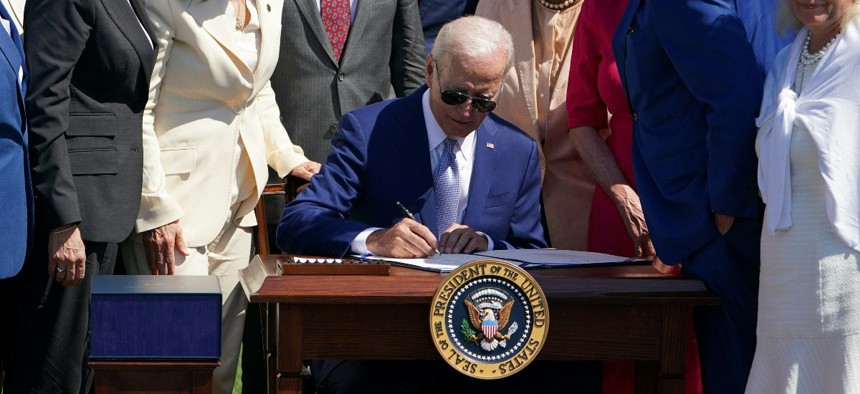The CHIPS and Science Act Became Law, Now What?

US President Joe Biden signs H.R. 4346, the CHIPS and Science Act of 2022, on the South Lawn of the White House in Washington, DC, on August 9, 2022. Photo by MANDEL NGAN/AFP via Getty Images
Signing the CHIPS and Science Act was just the start for enhancing U.S. economic strength and national security.
On Tuesday morning President Joe Biden signed a $280 billion bipartisan bill to strengthen domestic manufacturing of semiconductors in an effort to not rely as heavily on overseas production of these important tech components.
The bill—officially known as the CHIPS and Science Act—became law yesterday. It will provide $52 billion to subsidize U.S. semiconductor manufacturing and billions in additional funding for emerging technology research and development.
“Today is a day for builders,” President Biden said at the Rose Garden ceremony. “Today, I’m signing the CHIPS and Science Act - a once in a generation investment in America itself.”
Proponents of the legislation have been pushing to get it passed, citing economic and national security reasons. The United States had a 37% market share of semiconductor production in 1990, and today it is about 12%, representing the high-end semiconductors produced in the U.S. Asian countries subsidized their semiconductor industry, which helped to exponentially grow their semiconductor production market share. While the U.S. investment is large, other countries are investing more into semiconductors. For example, last May, South Korea announced $450 billion in funding over the next 10 years for semiconductors. China is also significantly investing in this area.
“General Secretary Xi Jinping is propping up China's semiconductor manufacturing by committing $1 trillion over the next 10 years,” Keith Krach, former Under Secretary of State and chairman of the Krach Institute for Tech Diplomacy at Purdue University, said. “He is terrified that a united United States will commit to the equivalent of a moonshot. The bipartisan CHIPS and Science Act may do exactly that, taking the technological advantage away from China Inc. and returning it to the United States.”
Bonnie Glick, director of the Krach Institute for Tech Diplomacy at Purdue University and former Deputy Administrator and Chief Operating Officer of the U.S. Agency for International Development, highlighted the significance of the legislation.
“The CHIPS Act was extremely important not just for tech diplomacy, but for America’s competition overall and competition in the geostrategic realm in particular,” Glick told Nextgov.
Glick noted that the law was aimed at protecting more than just economic interests.
“The CHIPS Act is a national security piece of legislation, whether it's officially called that or not,” Glick said. “The point of the CHIPS Act is to foster an environment where America remains competitive as the world’s largest and strongest economy.”
Krach also detailed the importance of this legislation for national security, particularly in competition with China.
“Our adversaries, starting with the Chinese Communist Party, are playing a game of four-dimensional military, economic, diplomatic and cultural chess, and the crossroads and the main battlefield is technology,” Krach said. “The CHIPS and Science Act will help American tech companies build, expand and modernize domestic facilities and equipment for semiconductor production and accelerate research in AI, quantum computing, 6G, hypersonics and other national security technologies.”
Mark Granahan, CEO of iDeal Semiconductor—a fabless semiconductor company, noted the importance of this legislation in the IT supply chain as a whole.
“For the sector overall, it’s a huge infusion of capital,” Granahan told Nextgov. “It’s going to mean that the U.S. is hopefully set out on a multi-decade endeavor to re-shore or onshore a lot of the semiconductor supply chain, starting with actual wafers themselves, but we can’t complete the supply chain unless we assemble and test the products also here in the Americas.”
Granahan also noted the importance of expanding production in the U.S. beyond advanced semiconductors.
While the United States is invested in protecting its national security interests and helping innovation at home, it is also working with its allies to enhance semiconductors and protect the supply chain. At the economic “two-plus-two” with Japan, the countries stated they will create a research hub for the next-generation of semiconductors to help secure the supply chain and further innovation.
“That's super exciting that two of the most advanced economies in the world—with some of the best trained minds in the world in the semiconductor field—are going to collaborate on this next-gen semiconductor,” Glick said.
In addition to funding, there are other semiconductor-related issues that must be addressed. In July, the Government Accountability Office issued a report on policy options and considerations to decrease semiconductor supply chain risks and lessen future shortages. Echoing that report, both Glick and Granahan stressed the importance of STEM education to address future needs and workforce shortages. Glick stated that there is a predicted shortage of 50,000 semiconductor engineers worldwide in the sector between now and 2025.
“The investment will create thousands of jobs across the entire supply chain and create a broad ripple effect of technical training and know-how throughout the tech ecosystem,” Krach said.
But the experts highlighted that the CHIPS Act is not the be-all-end-all in this space.
“I’m hoping the CHIPS Act and some of the policies that will closely follow the CHIPS Act will expand the capabilities and capacities of assembly and test and kind of round out a full supply chain here,” Granahan said.
Meanwhile, Glick noted key items that were tossed out of the newly-enacted law, some of which appeared in earlier versions.
“There was a lot that was left out of the final CHIPS Act, most significantly from a national security perspective are the guardrails that had been put in place to guard against American technology going to China,” Glick said. “Some of those appear to have been lessened or removed. That’s a failing of the CHIPS Act. I think you saw it in this proposed Portman Amendment that was taken out. It’s really important that American investment benefits America and not our adversaries.”






